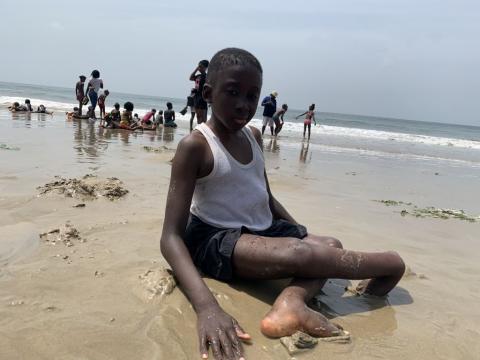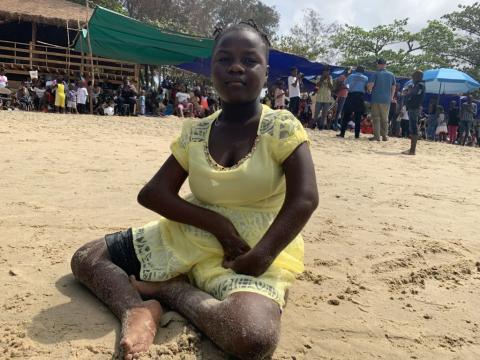By Mohamed Jaward Nyallay
Hundreds of children living with various disabilities were treated to an outing on Lumley Beach on Saturday as part of an annual event for disabled children in the Western Area organized by the ENABLE THE CHILDREN project at World Hope International.
Their disabilities ranged from spina bifida, brain injury, tuberculosis of the spine, autism, Down syndrome to congenital disorder. They also included amputees. They complained of stigmatization by communities and discrimination by school authorities, with the ministry of social welfare apparently having no clear plan to ameliorate their situation.
The programme lead and physiotherapist for Enable the Children, Anna Vines called for a supportive environment for children with disabilities and an end to stigmatization.
Speaking to Politico during the festival, she said: “We need to educate and encourage people to say disability is not inability. Also, we need to teach and encourage people to do more whether it’s looking after their children or whether the stakeholders need to be acting in terms of fighting stigma in the community”.
She said the event had helped inspire people over time and changed perceptions by bringing different caregivers, parents and children to understand their common challenges and help each other.
During his statement at the event, the Deputy Minister of Social Welfare, Mohamed Haji Kella also spoke against discrimination of children with disability.
“We should not discriminate or associate their situation to witchcraft. If someone is disabled and you give them the support, this will help their lives,” Kella said.
Speaking to Politico, the deputy minister described the situation of disabled children in the country as “deplorable”, adding that despite institutions like the Disability Commission and the new standalone Ministry of Social Welfare the government needed to do more for the kids in terms of catering for those with special needs in schools.
Daniella Kennedy is a 12-year-old has stiff joints and cannot move her arms and legs and needs someone to help carry her and feed her. Her mother, Isatu Sesay told Politico that she could not find a school for her daughter because none of the schools could provide the care she needed.
“We have tried several schools and they haven’t accepted her because they can’t cater for her special needs. So, she is home and I am teaching her. This Monday we are trying to take our chance at a school in our Dwarzack neighbourhood,” she said.
Daniella, who is articulate albeit shy, said she would love to go to school.
Minister Kella made a commitment to go with them to the school. He said they were trying to fix the problem but acknowledged that they must do more to cater for children like Danniella.
“This is the reason we are trying to do our best; but it is not enough. Daniella’s story is one of many other stories that we have. The expertise for people who can be in those schools, who have the right skills, the right knowledge to be able to provide the support that they need, we have them minimal,” Kella said.
Sahr Johnson is 16. He attends a school in Waterloo. His disability prevents him from using his feet and controlling his bowel. He told Politico that he faces discrimination in school every day.
Sylvia Swarray has an 8-year-old daughter, Deborah whose hands and feet were almost paralyzed until a surgery through the Enable the Children program a few years back partially rescued her. She said the discrimination against her kid was almost unbearable.
“My neighbours and friends discriminated against my child, they wouldn’t even hold her. But I thank God, since the surgery, her life has been better.”
Deborah is in class three now and said she wanted to be a banker. With her condition improving, she has a shot at realizing her dream.
Disability in Sierra Leone is mostly associated with witchcraft and other superstitious beliefs. The children are either abandoned or mostly raised and cared for by their mothers alone. At the festival over the weekend, it was mostly mothers who accompanied the children with very few dads present.
This year’s program targeted up to 2000 people, 800 of them are children living with different disabilities.









